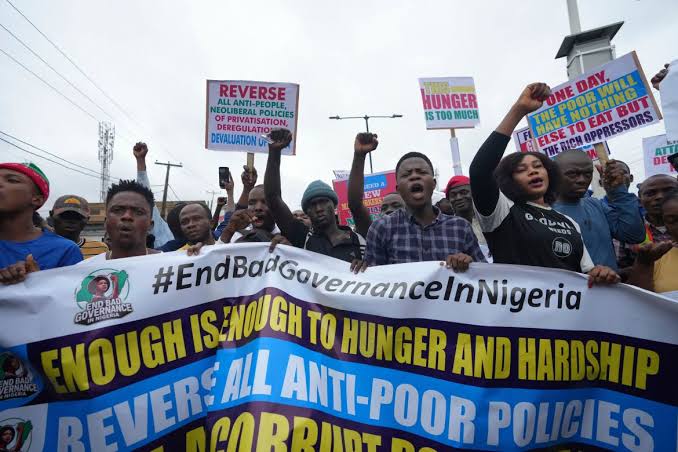By Barnabas Esiet.
Nigerians took to the streets in various cities, including Lagos, Kano, Abuja, Kaduna, and Bauchi, to protest against the high cost of living and bad governance.
The protests, tagged #EndbadGovernanceinNigeria, were sparked by soaring inflation, a devalued local currency, and a tripling of fuel prices.
Despite government efforts to alleviate economic pain, protesters demanded better living conditions.
In Kano, protesters tried to light bonfires outside the state governor’s office, but were met with tear gas from police.
In Lagos, several hundred protesters marched in the Ikeja area. In Abuja, security forces blocked off roads leading to Eagle Square, but protesters gathered at the nearby national stadium before marching towards the square.
Protesters carried placards with various inscriptions, including “End bad governance” and “We want better living conditions.”
Many Nigerians are struggling with high costs, including food inflation at 40 percent, and a tripling of fuel prices.
The government had urged young activists to reject rallies and allow time for President Tinubu’s administration’s reforms to take hold and improve the economy.
However, protest leaders vowed to press on with rallies despite legal challenges.
The protests come after similar demonstrations in Kenya, where the government was forced to abandon new taxes.
In Uganda, officials arrested dozens of protesters earlier this month after they took part in banned anti-corruption protests.
The last major protest in Nigeria was in 2020, when young activists rallied against the brutality of the SARS anti-robbery squad.
The rallies ended in bloodshed in Lagos, with rights groups accusing the army of opening fire on peaceful protesters.
The Nigerian government recognizes the right to peaceful protest but has urged caution and vigilance.
The protests have attracted widespread support, with many Nigerians demanding better living conditions and an end to bad governance.









Comment here